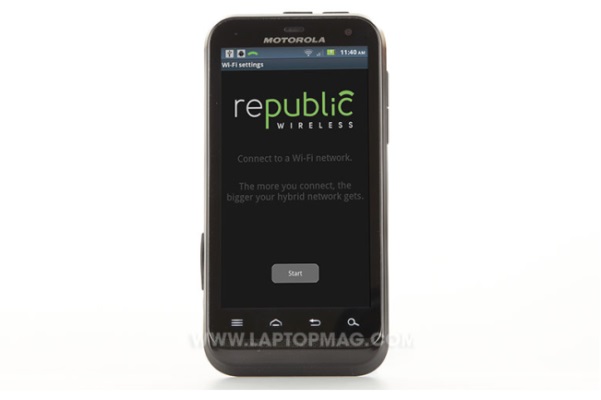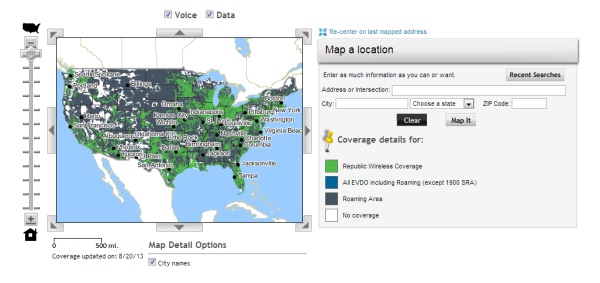Republic Wireless: Everything You Need to Know
Sign up to receive The Snapshot, a free special dispatch from Laptop Mag, in your inbox.
You are now subscribed
Your newsletter sign-up was successful
Mobile upstart Republic Wireless is shaking up the status quo with its simple, inexpensive, contract-free smartphone pricing. We're talking as low as $19 per month. The innovative carrier's Hybrid Calling model uses the Wi-Fi to reduce overall usage costs, even for voice calls. So, how much will it save you, and how does it work? Just as important, is there a catch? We have answers to all the essential questions.
1. What is Republic Wireless?
Based in Raleigh, N.C., Republic Wireless is a division of Bandwidth.com, a mobile virtual network operator (MVNO) that operates its own nationwide IP network for voice and SMS text calls. Bandwidth.com supplies VoIP network services to numerous familiar names, including Skype, Google and Pinger. The Republic Wireless mobile service has been in beta and has slowly rolled out to new subscribers over the past year.
2. How does the service work?
Place your call, and use whichever signal is best — Wi-Fi or cellular (using Sprint's network). Republic's icon sits in the notifications bar; when the arc is green, you're on Wi-Fi, and when it's gray, you're on the cellular network. Placing a call on Wi-Fi requires no additional steps, as long as you've already set up that Wi-Fi network to automatically connect. You don't need a separate app for Wi-Fi calling, because everything goes through the standard Android dialer.
However, Republic does offer an Android app that integrates Devicescape (also integrated into Republic's handset) to make it easier to connect to public hotspots, such as those at Starbucks or the airport. The company says the minimum Wi-Fi requirement is 80 Kbps upstream and downstream.
If you're on the Wi-Fi connection and move away from the signal, the phone will drop the call. (In other words, the service isn't yet smart enough to let you seamlessly roam between Wi-Fi and cellular.) You'll get a prompt to automatically redial that number, though. You do get 911 access via Wi-Fi calls, which Republic says is unique to its service.
Sign up to receive The Snapshot, a free special dispatch from Laptop Mag, in your inbox.
3. Is there a data limit?
Republic Wireless provides unlimited data, no strings attached. However, the service doesn't support 4G, nor does it allow for tethering — that's not allowed, per the occasionally wittyRepublic Wireless Terms of Service. The company says its ability to provide its low-cost smartphone plans is dependent on its customers usage of Wi-Fi whenever possible.
MORE: Best Free Texting Apps 2013
4. What phones are available?
Right now, Republic Wireless offers only one phone: the Motorola Defy XT. We like that the handset is water and scratch resistant, but it runs the old Android Gingerbread OS, and its 3.7-inch screen is relatively small. The phone is available online at Republic Wireless, for either $199 or $79, depending on your monthly payment plan (see "What's the monthly cost?" below). Republic says it plans to release more phones this year.
5. What's the monthly cost?
The more you spend up front for the device, the less your monthly fee will be. If you spend $199 on the phone, you'll pay $19 per month, and if you spend $79 on the phone, you'll pay $29 per month. Those service fees include unlimited calling, texting and data. There's no contract, but you do have the usual taxes and fees. If you add an additional $19 per month line, you can knock $50 off the handset's cost.
6. What is the coverage like? Is there 4G?
Coverage is nationwide, via Sprint's CDMA-based 3G EVDO network. That means there will be some areas with roaming, and a few pockets of no service, according to this coverage map. As already noted, Republic doesn't have 4G service at this time.
7. How much can Republic Wireless save you?
The following comparison is clearly not apples-to-apples, since competing services will provide 4G connections, better phones and other features Republic lacks. On the other hand, some carriers lack the unlimited data service that Republic offers. But here's a numbers breakdown that underscores just how much you can save.
If you purchased a Defy XT from Republic Wireless for $199 and signed up for the $19 monthly plan, you would wind up spending just $655 over the course of two years (not including taxes and other fees).
MORE: Best Smartphones 2013
Let's compare that total to what you'd pay on Virgin Mobile, which offers one of the most affordable plans, at $35 per month. That plan includes 2.5GB of data, unlimited messages and 300 anytime minutes. If you bought the midrange LG Optimus F3 4G LTE for $153, your two-year cost would be $993. In other words, opting for Republic Wireless could save you $338 over two years.
Under a two-year contract at AT&T, a Mobile Share plan costs $95 per month for 2GB of data and unlimited texts and voice minutes. Even if you picked up a free smartphone, that's $2,280 over two years, or $1,625 more than you'd pay with Republic Wireless.
8. What are the drawbacks?
The lack of 4G LTE support is a big constraint for Republic Wireless right now. So is the lack of tethering and hotspot support, MMS and phone customer service (all support is done via online forums). You have to use only Republic Wireless' phone; you can't bring your own device over to Republic. You can't make international calls from the U.S., either, which is disappointing considering the phone actually can be used to place calls while overseas to the U.S., via Wi-Fi. However, by using Fring or Tango, you can get around that limitation.
But the most critical drawback is the service's inability to switch between Wi-Fi and cellular networks, which makes for a very unsatisfying experience if you dare to move out of a Wi-Fi zone while on a call.
In addition, the Defy XT is an older phone that runs the outdated Android 2.3.7, with no upgrade forthcoming. Yes, with the Defy XT, you step back in time to the Android Gingerbread era — four versions behind Google's current Android 4.3. With its ancient OS, older components — the phone has only a single-core processor — and its reliance on Sprint's CDMA 3G network, the Defy XT will never break any speed records.
9. Is Republic Wireless worth it?
There's no denying that Republic Wireless trounces the competition when it comes to savings. It's hard to beat just $19 per month. However, you have to be willing to live with a number of caveats. At least for now, you're limited to a single handset — and a very old one at that — and you're stuck with 3G when you're outside Wi-Fi range.
If you do spend a lot of time on Wi-Fi networks and you're looking to pay as little as possible per month for phone service, Republic Wireless is worth a look, but you may want to wait for the provider to offer newer and better phones.

Melissa Perenson has deep expertise in phones, tablets, e-readers, laptops, monitors, storage, and cameras. She buys way too many of the things she writes about it and has worked as an editor at Forbes Vetted, PCWorld, PCMag, and ZDNet, and as a writer at countless publications, including Laptop Mag, Tom’s Guide, and TechRadar.


